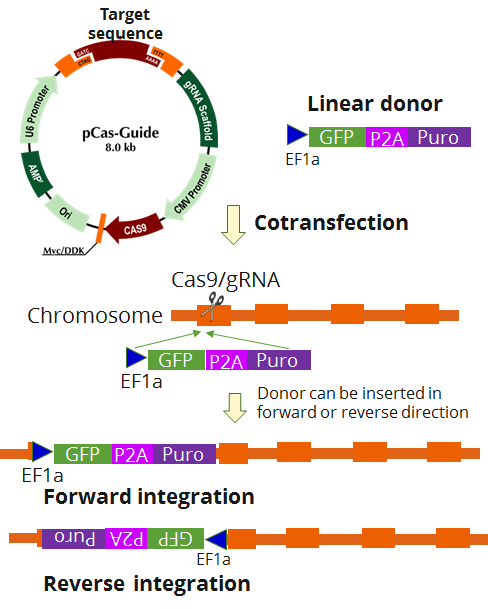Angiogenin (ANG) Human Gene Knockout Kit (CRISPR)
CAT#: KN408874
ANG - KN2.0, Human gene knockout kit via CRISPR, non-homology mediated.
KN2.0 knockout kit validation
KN408874 is the updated version of KN208874.
USD 1,290.00
2 Weeks*
Size
Other products for "Angiogenin"
Specifications
| Product Data | |
| Format | 2 gRNA vectors, 1 linear donor |
| Donor DNA | EF1a-GFP-P2A-Puro |
| Symbol | Angiogenin |
| Locus ID | 283 |
| Disclaimer | The kit is designed based on the best knowledge of CRISPR technology. The system has been functionally validated for knocking-in the cassette downstream the native promoter. The efficiency of the knock-out varies due to the nature of the biology and the complexity of the experimental process. |
| Reference Data | |
| RefSeq | NM_001097577, NM_001145 |
| Synonyms | ALS9; HEL168; RAA1; RNASE4; RNASE5 |
| Summary | 'The protein encoded by this gene is a member of the RNase A superfamily though it has relatively weak ribonucleolytic activity. This protein is a potent mediator of new blood vessel formation and thus, in addition to the name RNase5, is commonly called angiogenin. This protein induces angiogenesis after binding to actin on the surface of endothelial cells. This protein also accumulates at the nucleolus where it stimulates ribosomal transcription. Under stress conditions this protein translocates to the cytosol where it hydrolyzes cellular tRNAs and influences protein synthesis. A signal peptide is cleaved from the precursor protein to produce a mature protein which contains a nuclear localization signal, a cell binding motif, and a catalytic domain. This protein has been shown to be both neurotrophic and neuroprotective and the mature protein has antimicrobial activity against some bacteria and fungi, including S. pneumoniae and C. albicans. Due to its effect on rRNA production and angiogenesis this gene plays important roles in cell growth and tumor progression. Mutations in this gene are associated with progression of amyotrophic lateral sclerosis (ALS). This gene and the neighboring RNase4 gene share promoters and 5' exons though each gene then splices to a distinct 3' exon containing the complete coding region of each gene. Alternative splicing results in multiple transcript variants encoding the same protein. [provided by RefSeq, Jul 2020]' |
Documents
| Product Manuals |
| FAQs |
Resources
Other Versions
| SKU | Description | Size | Price |
|---|---|---|---|
| GA100196 | ANG CRISPRa kit - CRISPR gene activation of human angiogenin |
USD 1,290.00 |
{0} Product Review(s)
0 Product Review(s)
Submit review
Be the first one to submit a review
Product Citations
*Delivery time may vary from web posted schedule. Occasional delays may occur due to unforeseen
complexities in the preparation of your product. International customers may expect an additional 1-2 weeks
in shipping.






























































































































































































































































 Germany
Germany
 Japan
Japan
 United Kingdom
United Kingdom
 China
China

